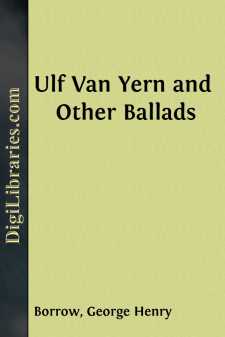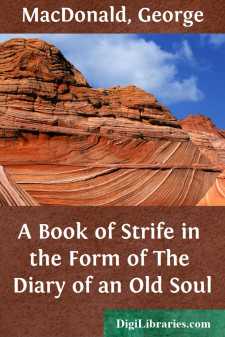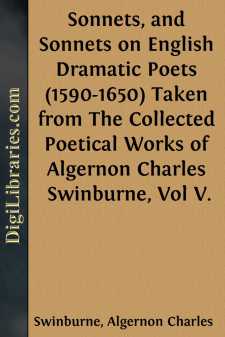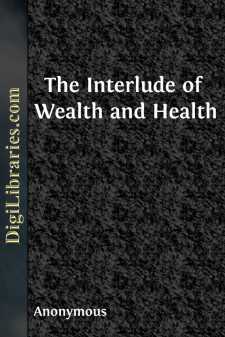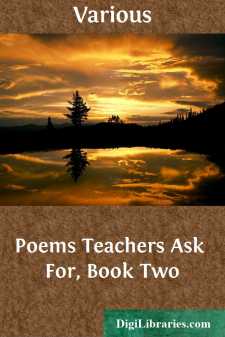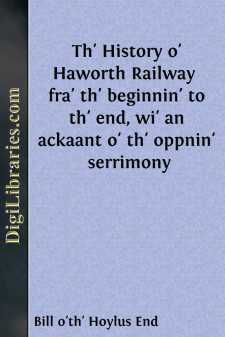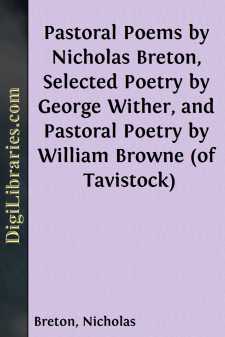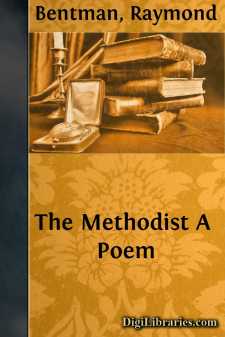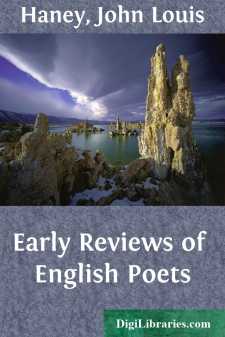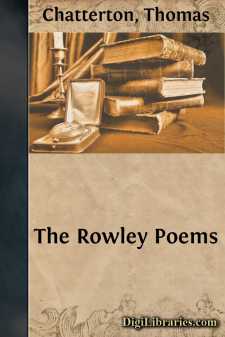Poetry
- American 96
- Ancient, Classical & Medieval 41
- Asian 15
- Australian & Oceanian 11
- Canadian 11
- Caribbean & Latin American 5
- Children's Poetry & Nursery rhymes 51
- Continental European 11
- English, Irish, Scottish, Welsh
- General 483
- Inspirational & Religious 7
- Middle Eastern 3
English, Irish, Scottish, Welsh Books
Sort by:
ULF VAN YERN It was youthful Ulf Van Yern Goes before the King to stand:“To avenge my father’s death Lend me warriors of thy band.” “Of my kemps I’ll lend thee them Who to follow thee consent;Ask’st thou Vidrik Verlandson Thou wilt further thy intent. “I will lend thee of my men, Thou shalt have the very flower;Vidrik, and stark Diderik, Many kemps have felt their...
more...
by:
George MacDonald
THE DIARY OF AN OLD SOUL. 1. LORD, what I once had done with youthful might,Had I been from the first true to the truth,Grant me, now old, to do—with better sight,And humbler heart, if not the brain of youth;So wilt thou, in thy gentleness and ruth,Lead back thy old soul, by the path of pain,Round to his best—young eyes and heart and brain. 2. A dim aurora rises in my east,Beyond the line of jagged...
more...
HOPE AND FEARBeneath the shadow of dawn's aerial cope,With eyes enkindled as the sun's own sphere,Hope from the front of youth in godlike cheerLooks Godward, past the shades where blind men gropeRound the dark door that prayers nor dreams can ope,And makes for joy the very darkness dearThat gives her wide wings play; nor dreams that fearAt noon may rise and pierce the heart of hope.Then, when...
more...
by:
Anonymous
¶ Here entreth Welth, and Helth Ðâ¦ÐÑynging togethera balet of two partes, and after Ðâ¦ÐÑpeakethWelth. Why is there no curteÐâ¦ÐÑy, now I am comeI tcowe that all the people be dumeOr els Ðâ¦ÐÑo god helpe me and halydumThey were almost a fleepe.No wordes I harde, nor yet no talkingNo inÐâ¦ÐÑtrument went nor ballattes...
more...
by:
Various
PREFACE In homely phrase, this is a sort of "second helping" of a dish that has pleased the taste of thousands. Our first collection of Poems Teachers Ask For was the response to a demand for such a book, and this present volume is the response to a demand for "more." In Book One it was impracticable to use all of the many poems entitled to inclusion on the basis of their being desired....
more...
CHAPTER I. Before I commence mi short history o’ Haworth Railway, it might be as weel to say a word or two abaat Haworth itseln. It’s a city at’s little nawn, if onny, in th’ history o’ Ingland, tho thare’s no daat but it’s as oud as Methuslam, if net ouder, yet wi’ being built so far aat o’ th’ latitude o’ civilised nashuns, nobody’s scarcely nawn owt abaat it wal lately. ...
more...
by:
Nicholas Breton
There are few issues attended with greater uncertainty than the fate of a poet, and of the three represented herein it may be said that they survive but tardily in public interest. Such a state of things, in spite of all pleading, is quite beyond reason; hence the purport of this small Anthology is at once obvious. A group of poets graced with rarest charm and linked together by several and varied...
more...
by:
Raymond Bentman
INTRODUCTION Evan Lloyd’s works consist chiefly of four satires written in 1766 and 1767, all of which are now little-known. What little notice he receives today results from his friendship with John Wilkes and David Garrick and from one satire, The Methodist, which is usually included in surveys of anti-Methodist literature. For the most part, his obscurity is deserved. In The Methodist, however, he...
more...
by:
John Louis Haney
INTRODUCTION To the modern reader, with an abundance of periodicals of all sorts and upon all subjects at hand, it seems hardly possible that this wealth of ephemeral literature was virtually developed within the past two centuries. It offers such a rational means for the dissemination of the latest scientific and literary news that the mind undeceived by facts would naturally place the origin of the...
more...
II. THE VALUE OF ROWLEY'S POEMS—PHILOLOGICAL AND LITERARY As imitations of fifteenth-century composition it must be confessed the Rowley poems have very little value. Of Chatterton's method of antiquating something has already been said. He made himself an antique lexicon out of the glossary to Speght's Chaucer, and such words as were marked with a capital O, standing for...
more...


